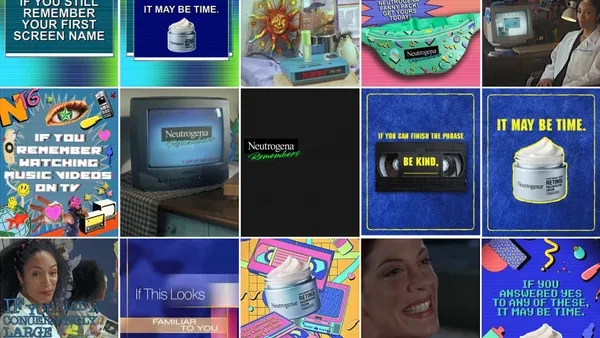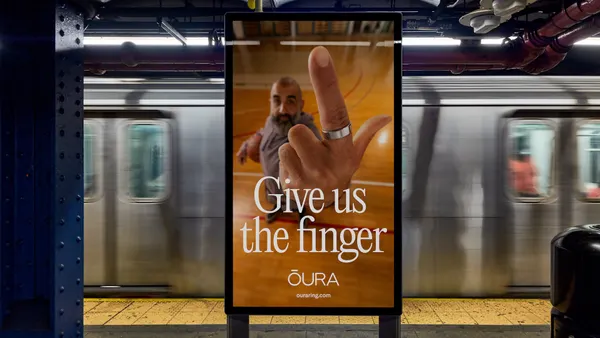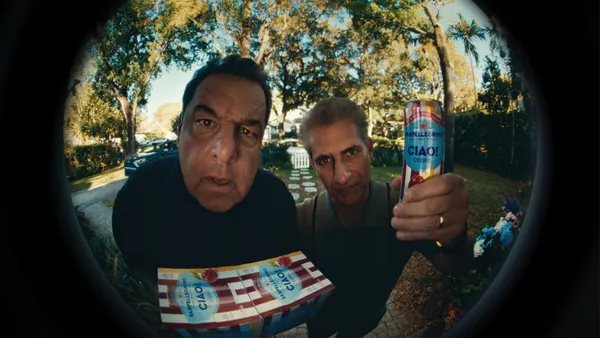Campaign Trail is our look at some of the best and worst new creative efforts from the marketing world. View past columns in the archives here.
Our editors' picks this week examine a feminine-products brand's provocative, body positive campaign, Spotify's latest go at data-driven out-of-home (OOH) advertising and a Stonyfield video that plays on turf popularized by "Parks & Recreation":
Spotify unwraps third iteration of lauded OOH campaign
The rundown: Spotify this week rolled out the third iteration of its year-end marketing campaign "Wrapped," which uses data from users' playlists and listening habits to inform OOH billboards. This year, more than 50 artists, such as Ariana Grande, Post Malone and Shakira with Maluma, appear in the creative and will crop up in markets where they are most popular, according to details shared with Marketing Dive. A billboard featuring Grande measures the amount of playlists that have "God is a man" versus "God is a woman" in them, with the latter crushing the competition.
Spotify's OOH initiative, which debuted in 2016, this year runs in the U.S., U.K., Australia, Brazil and Canada, among other countries, and includes digital and social media elements. For 2018, the campaign will also put a spotlight on the streaming platform's push into podcasts, showcasing shows like "My Favorite Murder," and play up memes like the Laurel versus Yanny debate or the popular, holiday-centric "I don’t give a s*** what the calendar says, it's christmas" playlist.
"Part of our creative process is to think about the cultural moments, tensions and oddities that defined 2018 and then see how music and podcasts helped people respond," Alex Bodman, global executive creative director at Spotify, said in a statement.
The results: Spotify's initial version of "Wrapped" was met with high praise when it rolled out two years ago, and has become an oft-cited example of how marketers are breathing fresh life into the OOH space by leveraging data and digital insights to bolster their outdoor creative. The streaming service's ability to tap into listeners' oddball habits and playlist naming conventions continues to yield funny results, with picks like "Yodel & Chill" and "Deep Scottish Yodel Trap" appearing on a billboard that ranks the top playlists for a decidedly niche genre.
And yet, in some ways, the effort feels like it could be getting a little tired. While Spotify was early to innovate with data-driven OOH, the tactic has grown increasingly popular, and subsequently demands more innovation to stand out. "Wrapped" trying to tie a bow on 2018 thematically, playing into "tensions and oddities," doesn't hang together especially well. More unified creative messaging — focusing the ads squarely around a holiday theme, for example, or getting even more overtly political, like with the Grande billboard — might've made a stronger impression.
Spotify dipping back into an old well without changing up the playbook too much might stem from the fact that it recently lost some high-profile marketing leadership, including former CMO Seth Farbman, who helped architect the original OOH campaign. One fresh addition this year is the promotion of podcasts on the platform, signaling how Spotify is pouring more resources into the audio format as it looks to extend its reach beyond music streaming. Spotify debuted its first branded podcast series, "Ebb & Flow," with Amsterdam Vodka as launch sponsor in August.
—Peter Adams
Stonyfield scoops up 'Parks & Rec' actor for organic fields push
The rundown: Yogurt brand Stonyfield Organic added some star power to its mission-based initiative by partnering with actor Adam Scott. A video shows the "Parks & Recreation" actor attempting to convince a team of bored kids the new rules for soccer games on fields treated with pesticides, from swapping the ball every 20 yards to celebrating a goal by handing out educational brochures.
"The Ridiculous New Rules of Soccer" campaign and its outlandish workarounds to a traditional game aims to highlight "how crazy it is that a majority of our parks and public fields are being sprayed every day with a chemical cocktail of harmful persistent pesticides," Stonyfield co-founder Gary Hirshberg said in a press release. The video is the latest in the brand's #PlayFree initiative, which kicked off in August and aims to shift communities' approach to grounds management toward organic practices.
One-minute clips of the creative were shared on Stonyfield's social media channels to extend the campaign's reach to the brand's collective 600,000 followers. To celebrate its 35th year in business and promote #PlayFree, Stonyfield is giving 35 communities advising and funding to convert their fields and parks to being pesticide-free.
The results: "The Ridiculous New Rules of Soccer" takes a humorous look at the presence of chemicals sprayed on public parks where kids play and communities gather. Enlisting Scott nods to his notable past role as Ben Wyatt and adds some star power to the effort that could increase appeal with fans of the actor who are hungry for more "Parks and Rec"-related content.
Stonyfield here also plays into the current movement toward purpose-driving brand messaging. The push for organic field management aligns with the marketer's food products and broader chemical-free mission, which could resonate with loyalists and consumers with similar values. The nearly four-minute runtime is still overlong for what's essentially a branded PSA — even if it is lighthearted. It also falls flat at the end, with Scott cutting his funny-buzzkill character to look directly into the camera for a spiel about Stonyfield's initiatives, closing with a clear call-to-action asking viewers to learn more on Stonyfield's site and stop treating their own yards with chemicals.
By splicing the relatively long video into 1-minute clips to share on social, Stonyfield could extend the shareability and viewership of the spot. As of press time, the long and short videos saw somewhat lagging viewership: just over 1,000 hits across YouTube and Twitter. The full video on Facebook generated Stonyfield's most promising number of 56,000 views.
—Natalie Koltun
Libresse doesn't shy away from female anatomy
The rundown: Swedish feminine-care brand Libresse on Nov. 23 unveiled a three-minute video called "Viva La Vulva" to promote its V-Care range of body washes, liners and wipes in Sweden and Denmark. Created with agency AMV BBDO, the ad uses conch shells, origami, oysters, handbags, cross stitch patterns, sea anemones and puppets, among other things, as visual metaphors for the vagina.
Helmed by ad and music video director Kim Gehrig, the ad is soundtracked by Camille Yarbrough's "Take Yo' Praise" (famously sampled by Fatboy Slim on his 1998 hit "Praise You") and recontextualizes its well-known lyrics: "We've come a long long way together / Through the hard times and the good / I have to celebrate you baby / I have to praise you like I should." The ad closes with first-person confessionals about the myths and misinformation about the female anatomy.
Libresse "wants to contribute to a more open culture where women can feel proud of what they have, can feel OK about talking about their genitals and can care for it without feeling ashamed," the brand said in a statement to Adweek.
The results: Libresse's ad — more Janelle Monae than Georgia O'Keeffe — is intentionally provocative, as it attempts to normalize the vagina in the marketing space of feminine products, which has historically addressed the female body through euphemism. It follows the brand's "Blood Normal" campaign, which challenged the stigmas around menstruation by showing period blood in ads and won the Glass Grand Prix at Cannes Lions.
The Libresse ads are the most explicit and daring to come out of a movement that prioritizes real bodies and body positivity over dated stereotypes and tired ad cliches. Thirty-six percent of consumers said they liked a brand more when its ads went against stereotypes, and 25% said they'd be more likely to make a purchase from those brands, according to a consumer survey by Choozle.
Brands are following the research. This year has seen major CPG companies modernize their approaches to gender portrayals in advertising. P&G announced several partnerships with media and advertising companies to advance gender equality in ad campaigns and support women in creative roles and Unilever expanded its Unstereotype initiative, an effort that began in 2016, by calling on content creators and distributors to remove any outdated stereotypes in their marketing. Similarly, both Dove and CVS have pledged to use unaltered photos in their campaigns, but few have matched the boldness of Libresse's effort.
—Chris Kelly











